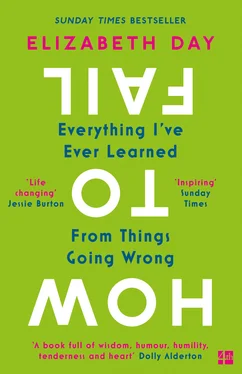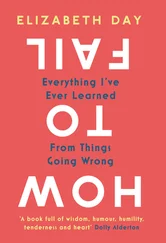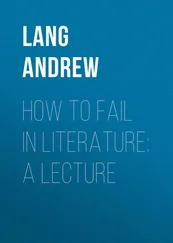1 ...6 7 8 10 11 12 ...15 I never did pick up an Irish accent but when I wrote my first novel, my publisher found out I’d grown up outside Derry and I went back to Ireland to promote it. By then, the 1998 Good Friday Agreement had brought peace to the Province and I was struck by how much lighter the atmosphere felt. In Derry, there were new buildings and shopping centres and a bridge that arced over the width of the River Foyle. In Belfast, I was interviewed by newspaper journalists and radio presenters who wanted to know about my schooldays and which other Irish writers I most admired. When the pieces were published or when the programmes aired, I was always introduced as a local novelist. I was welcomed everywhere I went, by people who bought me pints of Guinness and who showed demonstrable pride in me. After all those years, it didn’t matter to them how I spoke. It was the most amazing feeling.
What did it feel like? It felt like coming home.
How to Fail at Tests Contents Cover Title Page Copyright Dedication Epigraph Introduction How to Fail at Fitting In How to Fail at Tests How to Fail at Your Twenties How to Fail at Dating How to Fail at Sport How to Fail at Relationships How to Fail at Being Gwyneth Paltrow How to Fail at Work How to Fail at Friendship How to Fail at Babies How to Fail at Families How to Fail at Anger How to Fail at Success Afterword Acknowledgements About the Author Also by Elizabeth Day About the Publisher
When I went to that secondary school in England, I got really good at exams. I was more content, had better teachers and had already done half the year back in Belfast. At GCSE, I promptly dropped all the subjects I didn’t like without a backward glance. I became a straight-A student and my end-of-term reports were glowing with praise.
This was lucky because it felt as if I were constantly being made to take tests. Life was a morass of exams – weekly tests to check I’d learned my algebra and understood photosynthesis; end-of-term exams where the sun beat tauntingly through the classroom windows as I attempted to revise the finer points of Henry IV’s domestic policy; musical grades; GCSEs; A levels … it went on and on. And then, because I’d been studying so hard and straining my eyes poring over books and the library computer screens, it turned out I needed an eye test (and glasses) too.
The culture of continuous testing has got even worse since I left school in 1997. In 2018, the charity Childline reported delivering 3,135 counselling sessions on exam stress in the previous year, with half of those phone calls being with twelve- to fifteen-year-olds, some of whom spoke of ‘an overwhelming workload’ and ‘worries about whether they would get the grades they want’.
The sheer number of exams – from SATs to GCSEs to AS and A levels and beyond – means that, at some point, you will probably fail at least one and your sense of self risks being reduced to a series of red biro marks on foolscap and a percentage point informing you that you haven’t passed.
It’s hard not to take it personally. At my new school, the spectre of that 47 per cent Chemistry exam result in Belfast cast a long shadow. I’m not sure why it haunted me so. That particular test wasn’t of any great importance but it was still difficult to separate who I was as a person from the grotesque caricature I built up in my mind of a backward numbskull who couldn’t remember what happened to magnesium when it met a naked flame (did it ask it to put some clothes on? I wondered).
Why did that particular failure affect me so deeply? It was partly because my surgeon father was an excellent scientist and was forever trying to engage me in ‘experiments’. I remember once, at the age of seven, being encouraged to take a dead bat to my primary school for display on the Nature Table. Until this point, the Nature Table had consisted of shrivelled autumn leaves and the odd branch of pussy willow, each one neatly labelled in Mrs McCarter’s comforting round handwriting.
I had found the bat that morning in our attic, its furry black body lying like a winged comma on the floorboards. When I told my father, he was delighted, and took the opportunity to give me an informative little talk on the nature of nocturnal flight. He told me to wrap up the bat in kitchen roll and take it into school. My classmates would be fascinated, he said confidently – a dead bat was just the sort of thing the Nature Table needed.
He was mostly right. The other pupils were fascinated, although their fascination was somewhat ghoulish in tone and the majority of the girls were just plain terrified. Mrs McCarter recoiled in horror when I carefully unfolded the kitchen roll and offered up the dead bat in the damp palm of my hand.
It turned out the bat was not dead after all, but simply sleeping deeply, in a state of semi-hibernation. The drive to school and the subsequent commotion had woken the creature up and it leapt from my hands and started flying around the classroom, flapping its wings and causing Mrs McCarter to shriek in distress.
It was Liam Andrews who saved me: a boy who had been the subject of my fervent but unrequited crush for many months. Bravely, he shepherded the bat out through an open window. Everyone clapped. The Nature Table was restored to its former pussy-willowed glory. The bat was never mentioned again. And Liam Andrews thought I was a freak for the rest of my time at primary school.
The point being: my father was keen on science and, sweetly, he wanted me to share his enthusiasm. But I just didn’t have that kind of brain. I found it frustrating having to learn properties of chemicals by rote and I didn’t really want to know the inner workings of a rat or how heat was conducted through a baked potato. So when I got that 47 per cent in Chemistry, I felt it not only as an academic failure, but also as if I were, in some small but significant way, failing as a daughter. I was letting him down, as well as myself.
Tests are never just tests. They tap into all sorts of deeper issues too.
Looking back now, I also see that exam as symptomatic of my broader unhappiness. I had lost confidence socially after that episode with Siobhan, which meant I’d also lost confidence in my abilities. And when I knew I wasn’t good at something, I became less motivated. It’s a fairly standard human impulse: if I’m not going to succeed at this, the reasoning goes, then I’m not going to try. That way, I’ll lessen the humiliation when, inevitably, it comes.
But when I became better at exams, being ‘academic’ was something that wormed its way into my identity and into how I saw myself. I was rewarded and praised for it. This was beneficial in some ways – I worked hard because I wanted to keep on succeeding – but it also came with some negatives attached. It’s never a particularly good idea to build your sense of self on the shaky foundations of academic merit. The older you get, the more you realise that such markers are pretty arbitrary – especially in the arts subjects I’d chosen to pursue.
The author Jessie Burton came to this realisation as an adult after a lifetime spent doing well at school and cultivating ‘an intellectual maturity [that] can mask vulnerability’.
In her thirties, ‘I’d never, perhaps, tuned in emotionally. And I do think it has come from a more or less self-imposed state of doing. Doing things that garner applause or garner approval and therefore make me feel safe.
‘I think it was a pattern that was made way back when I was young and doing well at school and for most children, that’s our life … at age five, we’re at school a lot more than probably we’re at home … and that was always rewarding me. I did enjoy school; I loved it. And feeling that there was a formula there of working hard and getting the results and getting everyone’s approval and everything in the status quo being maintained.’
Читать дальше












